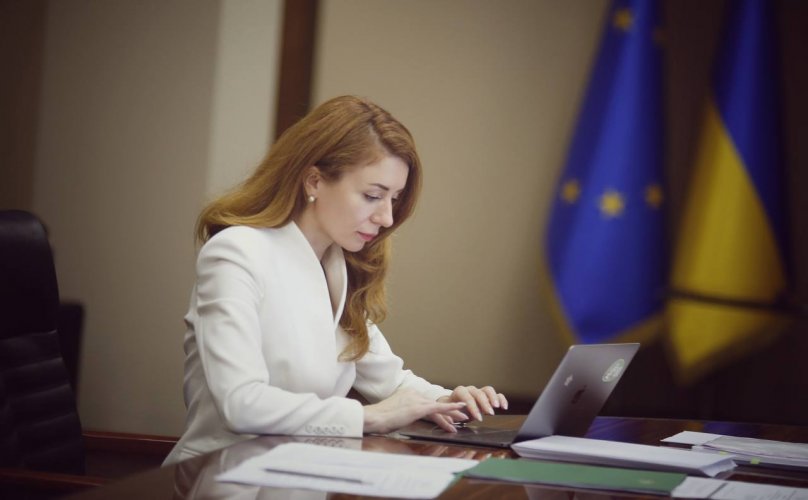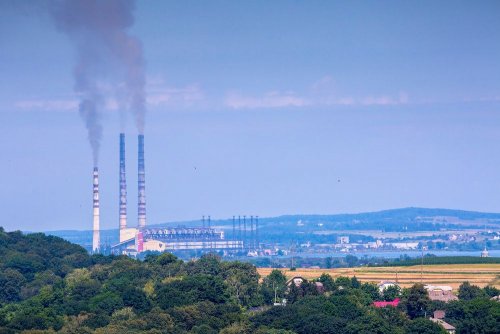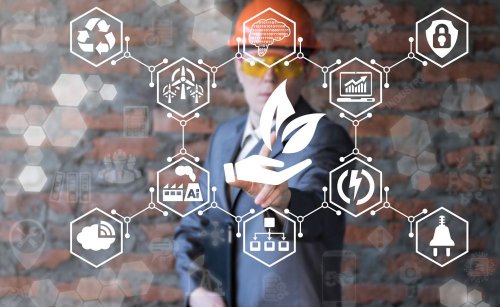Minister of Environmental Protection Svitlana Grynchuk took office at a difficult time. Environmental problems in Ukraine were very acutely on the agenda even before the full-scale war, and Russian aggression only worsened the situation – the damage caused by military actions already reaches billions of hryvnias. And while Ukraine is trying to persevere in the struggle for its own independence, Europe demands the rapid implementation of the provisions of the Green Deal and a number of European environmental norms and rules.
Ms. Grynchuk gave an exclusive interview to EcoPolitic and talked with us about what it's like to stand up for environmental issues during wartime.
- 5 environmental issues that you gave the highest priority and focused your attention on first after taking office?
Among my priorities as the Minister of Environmental Protection and Natural Resources of Ukraine is the continuation of environmental European integration reforms and the practical implementation of the provisions of Clause 8 of the Peace Formula "Environmental Security". We focus on water and forest policies and reforms of state environmental control, the field of subsoil use, waste management and industrial pollution prevention and, of course, the development of the nature reserve fund and the reform of climate and environmental finance.
- In Ukraine, arrests and criminal proceedings are taking place every week for large-scale illegal deforestation — in particular, we are talking about the forest industry workers themselves. It is obvious that the reform has failed, this has never happened before. How does the Ministry of Environment plan to protect Ukrainian forests from felling and export of wood abroad?
The reform of the forest sector is still ongoing. And as I have already said, among our goals is the corporatization of the State Enterprise "Forests of Ukraine" and the transformation of the forest sector into a transparent and profitable one. Our goal is to completely eradicate abuse and illegal activities. And for this, more than one year is needed.
Combating illegal logging, strengthening the fire infrastructure, increasing the area of forests by transferring self-forested areas to the forest fund, inventorying the forest and continuing the digitization of the industry – all this is systemic long-term work. As part of the reform, we have already introduced an electronic logging ticket and an electronic certificate of wood origin, strengthened control over the transportation of wood by photographing vehicles loaded with wood materials.
We plan to continue to take all necessary measures to further improve legislation to strengthen forest protection. In particular, an experimental project will be launched to track vehicles transporting wood, which will further strengthen control over its transportation.
- The reform of the State Ecoinspection has been ongoing for 7 years, but corruption still thrives in this body, and polls show that the activities of ecoinspectors are on the list of the biggest obstacles to doing business. The European Commission named this reform among the 5 priority tasks for 2024. At the same time, draft law No. 3091 "On Ecocontrol Reform" is used more for populism and PR. It's been 3 years now and nothing has moved since his first reading. Why is this reform stalling? Will this reform be implemented as proposed by your predecessors – by simply renaming the body?
Yes, indeed, the reform of environmental control began a long time ago, its main principles were defined back in 2017 by the Concept of Reforming the Ecocontrol System.
Today, the Ministry of Environment has reviewed the strategic goals and priorities of this policy. They are accumulated in the project of the Strategy for Reforming State Environmental Control. Currently, this document is being prepared for consideration by the government.
The strategy envisages an updated vision of the reform, formed on modern European practices and approaches, and takes into account previous experience. It defines strategic goals and priorities for the near future until 2026, and the operational plan outlines the practical steps for its phased implementation.
We also count on the approval of the second reading by the people's deputies as soon as possible of the corresponding project of the Law of Ukraine on State Environmental Control. We are working on this together with the Verkhovna Rada Committee on Environmental Policy and Nature Management. After all, without the adoption of this law, the full implementation of the environmental control reform is impossible.
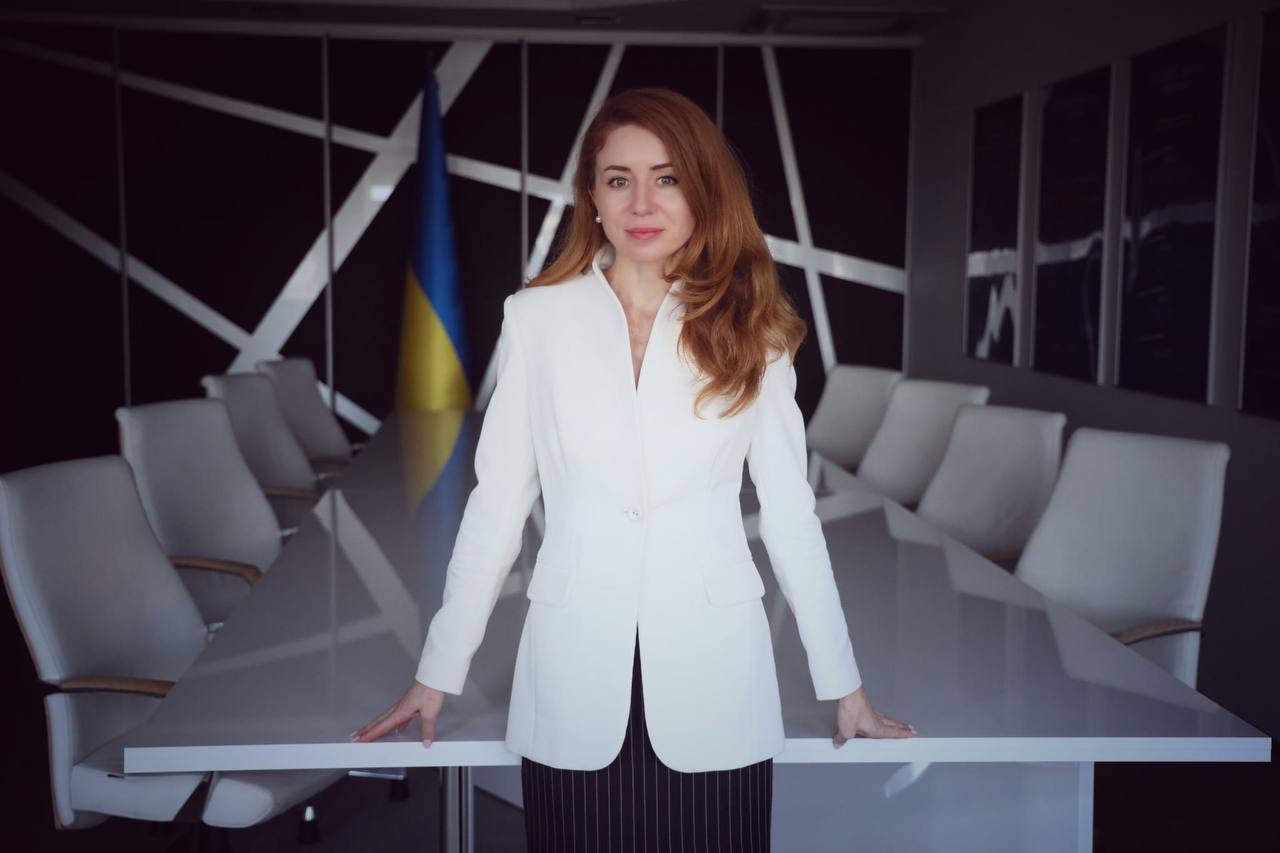
Photo: mepr.gov.ua.
- Why were the environmental draft laws, the adoption of which the EU insists, not in the focus of attention of the Verkhovna Rada either before the full-scale war, or now? From the outside, it seems that the ministry is not focused on implementing European principles and regulations, particularly environmental protection, but on business licensing, paperwork, and digitalization.
The Ministry of Environment fruitfully cooperates with the specialized committee of the Verkhovna Rada of Ukraine in all legislative initiatives and reforms. I can confidently say that each specialized unit takes care of its areas and moves our main environmental reforms step by step.
It is not for nothing that they say that our environmental section 27 is the most difficult – we have to fully implement about 200 EU legal acts.
For example, the report recently presented by the European Commission shows that, despite the armed aggression of the Russian Federation, Ukraine adopted the necessary legislation for further coordination of horizontal issues, as well as regarding water quality, waste management, and chemical safety. Significant progress has been observed in the formation of climate policy, in the creation of a legislative basis for reforming the waste management system. Instead, directions related to the creation of infrastructure (for water treatment, waste disposal) require additional resources and international support.
There are European norms that we implemented even before acquiring the status of a candidate state. For example, in the field of water resources management. Ukraine adapted its legislation to the EU Directive on environmental impact assessment and the Directive on strategic environmental assessment. But there are areas where changes have only just begun.
- Ukraine received a "one" and "two" from the European Commission for progress in environmental reforms in past years. It's very offensive, but it's understandable why. Will we move to the European principles of discussion and implementation of changes – with the involvement of experts, business, the public?
Short-term reforms in Ukraine are being formed with the involvement of all stakeholders – business, the public and the state. Last year, the European Commission in its report "Ukraine 2023" provided us with a number of recommendations for 2024. As of today, some of them have already been completed on time and in full, certain tasks have been partially completed, and several are at the stage of implementation.
- The Law on Industrial Pollution provides that old environmental permits will be valid for another 4 years after the law comes into force. However, for new users, an application for an integrated environmental permit must be submitted 3 months in advance. Do you think it's a level playing field for everyone? Why did such a legal conflict get into the law and will it be corrected?
In our opinion, no conflict exists, and the provisions of the Law are logical and consistent. According to the law, new installations that have not been put into operation and did not have previous permit documents must start their work according to the new rules defined by this law and, accordingly, obtain an integrated environmental permit.
Indeed, the law stipulates that operators of installations that are put into operation for the first time within 12 months from the date of entry into force of this law, submit an application for obtaining an integrated environmental permit no later than 3 months from the date of entry into force of this law.
The specified provision applies to operators who plan to enter into operation within the first year (12 months) from the date of entry into force of this law – and precisely in order to have time to obtain an integrated environmental permit during this period, the operator of the installation must, according to the law, submit an application within the first 3 months from the date of entry into force of the law.
This provision does not in any case oblige operators who are not in a hurry to put the installation into operation during the first year of the law to apply for an integrated environmental permit.
Of course, the operator of the installation can apply for an integrated environmental permit at any time convenient for him (not necessarily no later than 3 months after the date of entry into force of this law), but in this case the Ministry will not be able to guarantee that the operator installation will receive a permit within 12 months from the date of entry into force of this law.
I would like to draw your attention to the fact that with this provision of the law, we draw the attention of plant operators to the time frames that are necessary to complete the entire procedure for obtaining an integrated environmental permit.
In fact, compared to other countries, it is quite fast (approximately 120 working days, which is quite fast (up to 185 in the Czech Republic).
A similar logic is laid down by law in relation to installations that are already operating (that is, already put into operation and, obviously, have valid permits).
The term of validity of valid permits defined by law is 4 years, and the term for submitting an application for obtaining an integrated environmental permit is 3 years, which similarly takes into account the time for considering the application and issuing an integrated environmental permit (part six of Article 29 of the Law on Integrated Prevention and Control of Industrial pollution).
Taking into account that existing installations cannot immediately switch to integrated environmental permits, since they are already in operation, the law provides for a transition period of 4 years.
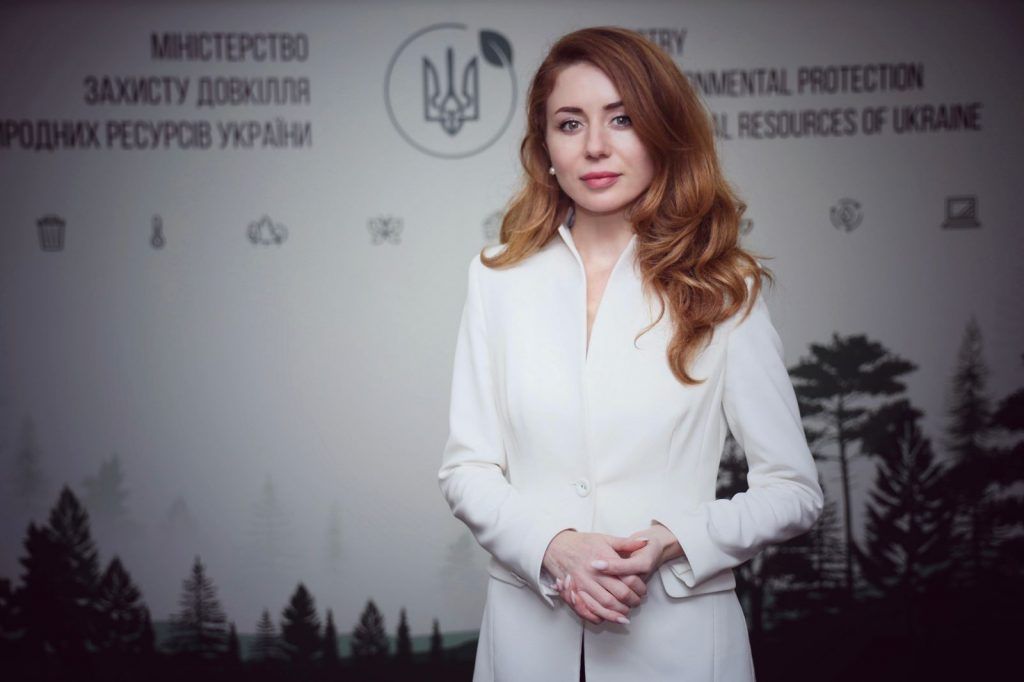
Photo: mepr.gov.ua.
- In your opinion, will large industrial enterprises manage to modernize their equipment in 4 years in wartime in such a way as to obtain an integrated environmental permit? Despite the fact that they are under fire and do not have the opportunity to attract investments during the war.
Of course, we understand business concerns about the potentially significant costs of implementing the best available technologies and management practices.
Therefore, we would like to inform you that the law provides for long periods before the entry into force of the new rules, which will allow many enterprises to implement new technologies within the normal cycles of modernization of their technological equipment.
The law provides for a gradual transition to a new permitting system and the best available technologies and management methods.
In particular, the conclusions of the best available technologies and management methods are applied no earlier than 4 years after the termination or cancellation of martial law, except for installations that are put into operation for the first time, from the date of entry into force of such conclusions.
Permits for emissions of pollutants into atmospheric air by stationary sources, permits for special water use, and permits for waste treatment operations received by plant operators shall expire from the date of receipt of the integrated environmental permit, but no later than 4 years from the date of entry into force of the law .
During the specified four-year period, the operators of installations carrying out the types of activities specified in the appendix to the law have the right to obtain an integrated environmental permit, obtain a permit for emissions of pollutants into the atmospheric air by stationary sources, a permit for special water use, and a permit for waste treatment operations in the manner established by law.
In addition, plant operators who do not want to modernize and plan to decommission the plant in the future will be given the opportunity to work in accordance with the environmental regulations that are in effect at the time of submitting an application for an integrated environmental permit for up to 10 years. Also, the operator of the installation may be granted a concession for the period of implementation of specific measures determined by the conditions of the integrated environmental permit. It cannot exceed 7 years from the date of application of the conclusions of the best available technologies and management methods for which a derogation is granted.
Thus, the law creates conditions for a gradual transition to a new permit system and the best available technologies and management methods.
In addition, for installation operators to implement the best available technologies, the draft law provides for the possibility of granting benefits for importing into Ukraine new equipment, equipment, components for them and materials that are not produced in Ukraine, in accordance with the requirements of tax and customs legislation.
Also, the ministry is already working on the development of the concept of a state target program to support enterprises implementing the best available technologies and management methods, the development of which is provided for by law.
For example, the GIZ grant program with the support of the German government has been implemented in Ukraine for the second year. Within its framework, the first Ukrainian enterprises receive grant funds in the amount of up to 2 million euros to co-finance the implementation of BATM. We continue to work on finding opportunities to attract other resources to make new technologies available.
- What are the prospects for the full functioning of the MRV system in Ukraine and how can Ukrainian enterprises be helped to submit reports and verify emissions during the war?
The Ukraine Facility plan for the II quarter of 2025 provides for the restoration of mandatory monitoring, reporting and verification of greenhouse gas emissions (GHG). For this purpose, we have already developed a draft of the Law of Ukraine "On Amendments to Some Legislative Acts of Ukraine Regarding Monitoring, Reporting and Verification of Greenhouse Gas Emissions".
The draft law was developed with the understanding that during the war some of the installations were destroyed or significantly damaged, and another part of the installations is located in the temporarily uncontrolled territory of Ukraine.
These changes provide for mandatory compliance with the requirements of the law on GHG during martial law, taking into account the security situation, registration of installations in automatic mode, specification of components and requirements for creation, maintenance of the Unified register of GHG, which will allow bringing the law of Ukraine on GHG into compliance with the requirements of the Law of Ukraine "On public electronic services".
We do understand that once reporting resumes, we may face the following risks:
- a large number of reports that will require verification, compared to a limited number of verifiers;
- verification of the operator's report takes a certain amount of time and in most cases requires the verifier to leave for installation and finalization of reports by the operator.
Therefore, it is necessary to develop ways of mutual recognition of national verifiers with European ones.
We understand that these changes can be difficult for both the state and business, so the Ministry of Environment, with the support of GIZ in Ukraine, is currently conducting training sessions for plant operators, verifiers, consultants and other interested parties in the field of monitoring, reporting and verification. We also plan to expand the list of types of activities and make changes to the current legal acts to bring the GHG system in line with the European one.
- Recent years of environmental reform and green transition have been implemented at the expense and with the help of grants and international "experts". The result for 5 years of such reforms is, as they say, "on the table". Does the ministry plan to form its own competence for the implementation of reforms? Will it rely on outsourcing?
The Ministry of Environment has its own competence and institutional memory. Of course, we, like the entire government apparatus, are going through not the best times, because many specialists have gone abroad or joined the ranks of the Armed Forces. In addition, no one canceled the military context. Consider that we are a country that is going through the process of European integration and reforms during a full-scale war and at the same time showing progress.
The presence of international technical assistance, specialists who are ready to provide high-quality expertise, is only a plus for us. After all, who, if not experts, who deeply know European legislation from the inside and have implemented it in their countries, can help us take into account the experience and mistakes of others on this path and reach the goal – integration into the EU – faster.
Such cooperation of Ukrainian and European experts allows for the development of the necessary legislative basis, taking into account both Ukrainian realities, the current national legal field, and compliance with European norms and requirements that we must implement. Joint work makes it possible to maintain this balance and adapt the best practices of EU legislation to Ukrainian realities.
EcoPolitics will continue to cover in detail the activities of the Ministry of Environment, follow the implementation of European integration reforms, and also talk about the manifestations of corruption in the industry and the interaction of the Ministry with stakeholders, experts and the public.

